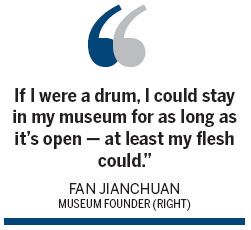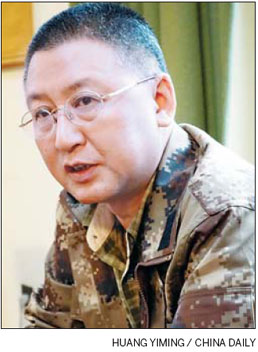
While many say Fan is eccentric - he also nicknamed his son "Double-cooked Pork" and pens profane calligraphy - nobody argues with his success.
He built his repository empire after stints as a farmer, soldier, university instructor, entrepreneur, medical doctor and deputy mayor of Sichuan's Yibin city - the job he quit to found his museum.
He hardly looks the part of tycoon, clad in mismatched camouflage pants and a jacket.
Fan shocked many by declaring he'll donate his museum outside Sichuan province's capital Chengdu to the central government when he dies.
"Even my daughter will have to pay admission," he says.
He explains he doesn't want his family to fight over the inheritance, and China's only historical sites that survived millennia were State properties.
"Wuhouci temple has lasted 1,780 years, Dufu's Thatched Cottage has endured more than a millennium and Dujiangyan's irrigation system stands 2,500 years later because they remained under government control," Fan says.
The museum has 22 halls and will add three this year. Fan hopes to open 30 to house his 8 million relics. About 3 million are under first-class national protection, he says.
"The 30 halls represent 30 years of opening-up and reform," Fan says.
"I was personally involved in, and benefited from, the policy."
While 30 halls are his hope, 100 are his "dream", he says.
"I want to do something unprecedented in China," Fan says.
"I hope God gives me another decade to do this. I was born to build museums."
His is the country's only repository with halls dedicated to the "cultural revolution" (1966-76) and Kuomintang.
His other buildings are devoted to such historical happenings as the Flying Tigers, the War of Resistance against Japanese Aggression (1937-45) and the 2008 Wenchuan earthquake.
Fan points out that, despite its extensive history, China ranks lowly in museums per-capita.
But they're critical to civilizations, he believes.

"These relics are a wakeup call to the Chinese," Fan says.
"They inform decision-makers. That's my museum's most important lesson."
Less than a month before the magnitude-7 Ya'an quake on April 20, 2013, he gave the example that his museum holds relics from many quakes that have jostled the Longmen fault line.
"If I live another 30 years, I'll see another major quake along Longmen," he told China Daily.
He saw one about three weeks later.
His motivation to collect and display relics comes from his belief they reference the past to advise the future.
Fan recalls rushing to the store when the Sanlu milk powder scandal broke in 2008.
The staff refused to sell him the melamine-tainted baby formula, he recalls, but he finally persuaded them.
"I'm probably the only person with two boxes of Sanlu milk powder," he says.
"They're monuments to a moment in history. Relics must be related to landmark events and be unique. That's what makes them relics."
He's now trying to obtain Wenzhou train crash wreckage and discontinued platforms that traffic police stood on in Chongqing municipality.
"My collection changes with time," he says.
But not every relic must be of national significance, he believes.
"Every family has a museum," he says.
"They have things like letters and photo albums. Families make good and bad decisions, and leave mementos of these choices - just like countries."
In this philosophy's spirit, Fan's office and library will be preserved after his death. And the 40 notebooks worth of diaries he has kept since age 12, plus more than 10,000 of his letters and photos, will be displayed.
Fan believes his story is a microcosm of the opening-up and reform.
"When I was a farmer, I earned 1 jiao (1.5 US cents) a day. I couldn't make use of my ambition. I fainted twice from hunger."
His museum earned 20 million ($3.25 million) yuan from ticket sales last year.
But Fan says money is only part of his, China's and the world's legacy.
"A country can't be considered advanced only because of its economy," Fan says.
"Its power also comes from culture. I must work hard for the cultural prosperity of China and the world."
Contact the writers through erik_nilsson@chinadaily.com.cn.
